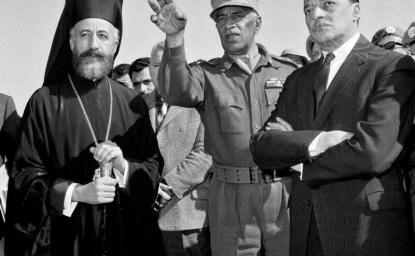THE TOXIC LEGACY OF THE COLD WAR IN THE FORMER SOVIET UNION:
ASSESSING CONDITIONS/FINDING SOLUTIONS
November 9-10, 1998
Washington, DC
Cosponsored by
The Environmental Change and Security Project
The Kennan Institute for Advanced Russian Studies
The Cold War International History Project
Agenda
November 9, 1998
(9:00-6:00)
9:00-9:10 Welcoming Remarks, Conference Goals and Format
(Breakfast) Geoffrey D. Dabelko
Director, Environmental Change and Security Project, Woodrow Wilson International Center
9:10-9:20 Conference Overview
D.J. Peterson
RAND Corporation and Woodrow Wilson International Center
9:20-9:40 Toxic Legacy in the U.S. and Russia: Tow Sides of the Same Coin?
Francis Macy
Center for Safe Energy, Earth Island Institute
9:40-10:20 Discussion
10:20-10:30 Break
10:30-10:35 Introduction of Panel: The Landscape of the Toxic Legacy
Geoffrey D. Dabelko
10:33-10:55 Behind the Nuclear Curtain
Donald Bradley
Technical Group Manager, Batelle/Pacific Northwest National Laboratories
10:55-11:15 Environmental Implications of Chemical Weapons Production, Storage, and Destruction
Lev A. Fedorov
Director, Union for Chemical Safety, Moscow
11:15-11:35 The Convention Military and Defense Industry Legacy
D.J. Peterson
11:35-12:30 Discussion
12:30-1:00 Break
1:00-1:20 U.S.-Russia Military Cooperation to Promote Environmental Security: A Review
Gary Vest
Principal Deputy Under Secretary of Defense for Environmental Security
1:20-2:15 Discussion
2:15-2:30 Break
2:30-2:35 Introduction of Panel: Regional Perspectives on Clean up and Redevelopment
Blair Ruble
Director, Kennan Institute for Advanced Russian Studies, Woodrow Wilson Center
2:35-2:55 NGO Initiatives to Assess the Condition and Utilization of Former Military Bases in Ukraine
Oleg Lystopad
Kiev Ecological and Cultural Center and Deputy Editor, Zeleny svit (Kiev)
2:55-3:15 Cleaning-Up and Rebuilding Valdivostok after the Soviet Navy
Boris Preobrazhensky
Institute of Oceanography (Vladivostok)
3:15-3:35 Wilderness and Biodiversity Benefit from Standoff and the Soviet Border
Margaret Williams
World Wildlife Federation and Editor, Russia Conservation News (Washington, DC)
Sergei Ponomarenko
Co-Director, Laboratory of Ecological Designs (Moscow)
3:35-4:30 Discussion
4:30-6:00 Reception
November 10, 1998
(9:00-3:30)
9:00-9:05 Welcoming Remarks
(Breakfast) Geoffrey D. Dabelko
9:05-9:10 Introduction of Panel: The Impact on Communities and the Role of NGOs
Christian Ostermann
Director, Cold War International History Project, Woodrow Wilson International Center
9:10-9:30 Fallout from Nuclear Weapons Testing: Public Health and Citizen Activism in Kazakhstan
Kaisha Atakhanova
Director, Karaganda EcoCenter (Kazakhstan)
9:30-9:50 Chelyabinsk Nuclear Weapons Complex: Environmental Attitudes and Activism in the Region
Paula Garb
School of Social Ecology, University of California-Irvine
9:50-10:10 Local Advocates vis a vis Facility Management (Moscow) and International Actors
Jennifer Adibi
EcoBridge Environmental Program for CEC International Partners
10:10-10:30 Discussion
10:30-10:45 Break
10:45-10:50 Introduction of Panel: The Military and its Management of the Environment
D.J. Peterson
10:50-11:10 Lessons Learned Working Up Close with Russian Nuclear Specialists
Ted Grochowski
Director, European Programs, NUKEM (Frankfurt)
Paul Childress
B&W Services Inc.
11:10-11:30 Kola Naval Nuclear Complex: Environmental Activism and State Secrecy Today
Thomas Nilsen
Bellona Foundation (Oslo)
Nils Bohmer
Bellona Foundation (Oslo)
11:30-12:30 Discussion
12:30-1:30 International Assistance: Opportunities and Stumbling Blocks
(Lunch) Sverre Stub
Norwegian Royal Ministry of Foreign Affairs (Oslo)
1:30-2:00 Discussion
2:00-2:15 Break
2:15-3:30 "What is to be done?": Discussion of Policy Options for the United States
Geoffrey D. Dabelko
D.J. Peterson
*This conference is made possible with the generous support of the U.S. Agency for International Development's office of Population through a cooperative agreement with the University of Michigan's Population Fellows Program and the Ploughshares Fund.

Cold War International History Project
The Cold War International History Project supports the full and prompt release of historical materials by governments on all sides of the Cold War. Read more




